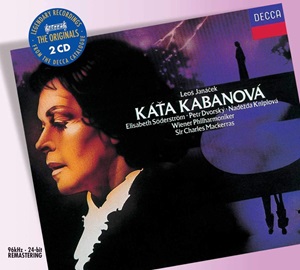
Leoš Janáček (1854-1928)
Káťa Kabanová (1919-21)
Elisabeth Söderström (soprano) – Katerina (Káťa);
Peter Dvorský (tenor) – Boris Grigorjevič;
Naděžda Kniplová (soprano) – Marfa Ignatěvna Kabanová (Kabanicha); Vladimír Krejčík (tenor) – Tichon Ivanyč Kabanov;
Dalibor Jedlička (bass baritone) – Savël Prokofjevic Dikój;
Libuše Márová (mezzo) – Varvara; Zdeněk Švehla (tenor) – Váňa Kudrjaš; Jitka Pavlová (mezzo) – Glaša; Jaroslav Souček (baritone) – Kuligin; Gertrude Jahn (mezzo) – Fekluša; Hedwig Dreschler (mezzo) – Žena;
Adolf Tomaschek (tenor) – Chodek
Vienna State Opera Chorus, Vienna Philharmonic Orchestra/Charles Mackerras
rec. 1976, Sofiensaal, Vienna
Available as a Digital Download in FLAC or MP3 formats
Decca 4218522 [100, plus additional fillers]
This was the first recording of Janáček’s opera to use a new edition of the score edited by Charles Mackerras. Aside from cleaning up the orchestration Mackerras had unearthed two orchestral interludes which had been removed from the score at some point. Their inclusion here guaranteed the opera was finally performed as the composer had intended. The recording achieved accolades from critics all around, and has been a mainstay in the catalogue ever since.
The overall achievement of Mackerras on the podium is matched by soprano Elisabeth Söderström’s shattering performance of the heroine. Söderström was one of the 20th century’s most deeply communicative sopranos. Her performances always had an emotional depth that seldom disappointed, no matter what her vocal state. For this recording, her voice is like textured glass, sometimes reflecting light and at other times exhibiting a fascinating transparency. She conveys every inch of the sensitive, vulnerable Káťa with her shimmering, glistening tone. In the final act as Káťa’s hysteria rises, she leaves nothing to the imagination of the listener. Her singing is warmly emotional during the rest of the opera. One fine example of this occurs in the second scene when she describes going to church as a girl, here she wraps the listener in the tender-hearted spell that she weaves purely with her vocal skills.
As her lover Boris, Peter Dvorský uses his bright, forthright tone and an admirably firm vocal line to gain the sympathy of the listener. He portrays the underlying sadness and loneliness of Boris as he and Káťa find respite with one another. Vladimír Krejčík’s thoughtless, emotionally stunted Tichon completes the love triangle.
Naděžda Kniplová’s slightly fermented soprano has a distinctly bottled-up sound which gives the Kabanicha an idiosyncratic, but rather memorable vocal profile. The role is not large, so the fact that she stands out from the crowd whenever she sings is a bonus in an audio recording. Libuše Márová’s Varvara is a much heavier voice than I am accustomed to hearing in this role. She has the dramatic sound of a Marina Mnishek rather than the usual lyric mezzo one encounters in performance. Still she offers an assured contrast to Söderström’s fragile Káťa’. Varvara’s lover, Kudrjaš is sung by Zdeněk Švehla who presents a persuasive portrait of the young, roguish teacher, although his tenor does not have an especially memorable tone. Dalibor Jedlička who was a Czech star baritone during the 1960s shows a still powerful voice and cherishable style as the merchant Dikój.
Over everything hovers the intense guiding hand of Charles Mackerras conducting a score that he had known intimately for 25 years when this recording was made. Mackerras had spent his student years in Prague and became deeply interested in the music of Janáček. He conducted the British premiere of this opera at the Sadler’s Wells Opera in 1951. Under Mackerras the orchestral drama is always alive and present around the singers. In the opening of the prelude, quietly mysterious chords gradually grow in intensity until they become storm music which intensifies to a shattering degree. Decca’s refined recording made in the superlative conditions of the permanent Decca studio at the Sofiensaal ensure every thread of the rich orchestration is heard. The Vienna Philharmonic give an intense display of expert musicianship. The chorus has very little to do other than provide haunting sound effects in this opera.
The opera is not very long, so Decca has included a well-performed recital of Janáček chamber works for orchestra that adds another 37 minutes to the opera’s running time. There is no digital booklet included with this download.
Mike Parr
Help us financially by purchasing from


Other works on this recording:
Leoš Janáček: Capriccio for piano (left hand) & chamber ensemble, JW VII / 12 ‘Vzdor’ [20]
Paul Crossley (piano)
London Sinfonietta/David Atherton
rec. 1978, Rosslyn Hill Chapel, London
Concertino, JW VII / 11 [17]
London Sinfonietta/David Atherton
rec. 1978, Rosslyn Hill Chapel, London

















